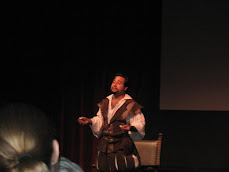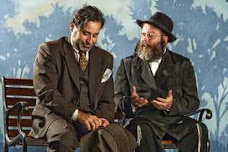Everything Goes Right, Delightfully, After Frau Loses Her Underpants
From: The Cleveland Plain Dealer
Date: March 8, 2004
Author: Tony Brown
The Underpants” is exactly the kind of entertainment the Cleveland Play House has been searching for: a play smart enough to be considered literature and slam-bang funny enough to qualify as slapstick.
It’s an unbeatable combination that gives us a fun and funny night out that will also satisfy a theatergoer’s hunger for just a little substance.
Although the pacing is a tad slow — the Cleveland production runs about 10 to 15 minutes longer than the zippy, 90-minute version seen off-Broadway in 2002 — the Play House gets just about everything right in this comedy about sex and sexual politics.
The play, about a neglected housewife, Louise Maske, who loses her underpants in public one day and suddenly finds herself pursued by strange men, began life in 1910. It was one in a series of social satires by German playwright Carl Sternheim, who saw his job as poking fun at the grim culture that would someday produce both Adolf Hitler and the Volkswagen Beetle.
Steve Martin, the wild-and-crazy guy who proved himself a playwright in 1993 with “Picasso at the Lapin Agile,” takes Sternheim’s already very funny play and sticks a comic arrow through its head.
The resulting play has a quaint, old-time comic feel with a hip, post-feminist edge. There are a couple of clunkers among the flood of jokes, and the story at brief intervals feels a little like a “Saturday Night Live” sketch that is about to go on too long. But the play just barrels ahead, and you can’t help going along for what turns out to be a happy ride.
Most significantly, Martin adds a twist to the ending, introducing a Molieresque deus ex machina to the dramatis personae, a royal character who allows our heroine, she of the fallen bloomers, to triumph over all those exasperating men.
The Play House production, directed with invention, if not always with alacrity, by Artistic Director Peter Hackett, starts off right, from the first instant we see set designer Bill Clarke’s witty take on Dusseldorf’s industrial/suburban landscape.
As Louise’s thoroughly shocked and selfish husband, Theo, Chaz Mena looks like a roly-poly, barbershop-quartet version of a pipsqueak Hitler, the kind of guy who enjoys scolding his wife for being beautiful: “You are much too attractive for a man in my position.”
Happily, Tanya Clarke’s Louise proves him absolutely correct, with her blond ringlets and her cheeks rouged liked a doll’s, not to mention the frilly underthings costume designer Kristine Kearney provides her with. Louise endears us with her innocence while at the same time agreeing to engage in an extramarital affair as a series of men suddenly start showing up, ostensibly to rent a room from the Maskes.
It’s an illicit affair that never takes place, thanks to the flustered urbanity of Sam Gregory as Frank Versati, the poet who is too in love with his words to actually make love to Louise.
Louise gets encouragement from upstairs neighbor Gertrude, played with a randy brand of nosiness by Johanna Morrison. Brad Bellamy works tirelessly as Benjamin Cohen, a shaggy barber who denies his Jewish heritage with the same fervor with which he attempts to protect Louise’s virtue from Versati.
And, as an oddball scientist named Klinglehoff, who really does only want to rent a room and knows nothing of the underpants incident, cutely hapless Ron Wilson brings an extra dose of eccentricity to the proceedings.
Hackett and company play Martin’s surprise addition to Sternheim’s original script with fanfare and blinding light and fog, which may at first seem like a bit too much.
But all the hoo-ha proves just the thing to go out on. And “The Underpants” proves to be just the thing the Play House has been desperately in search of: a bit of a laugh, along with a bit of something to think about on the way home with your own spouse.


















